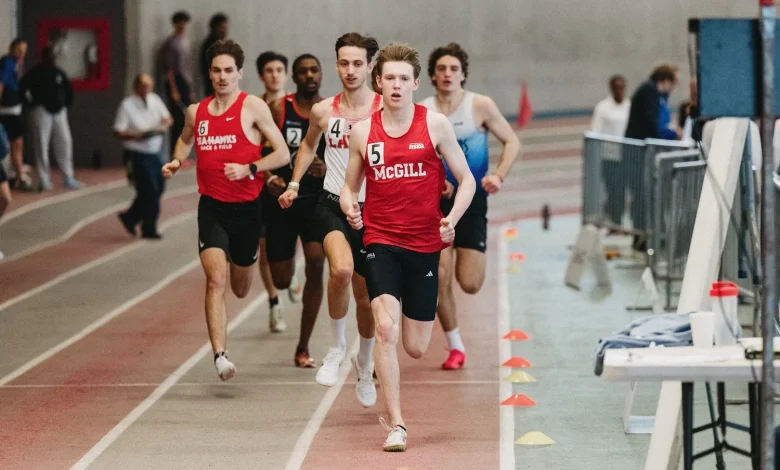McGill athletes react to axing of track and field program

On Thursday, the McGill University athletics department announced cuts to the school’s 125-year-old varsity men’s and women’s track and field programs, alongside 23 other teams and clubs, all of which will be discontinued for the 2026-27 school year. The news sparked disappointment and devastation, especially among athletes, who chose McGill for its prestigious academics and athletics programs.
On Friday, the McGill track team started a petition to fight the decision, which, as of Monday morning, has collected nearly 5,700 signatures. “[The response] has been overwhelming,” McGill long sprinter Will Sanders told Canadian Running. “The Canadian track community at large knows this is a mistake.”
Photo: C/O Will Sanders
What went into the decision
McGill conducted an internal audit in 2024 and an external review in 2025 due to limited space, budgets and staff.
“The findings from both reviews highlighted ongoing challenges related to facility space, budget constraints, and human resources capacity,” the announcement, signed by director of wellness programs and facility operations Perry Karnofsky and varsity sport program director Daniel Méthot, read. “Simply put, our unit can no longer effectively manage or support the same number of activities while maintaining the standards of excellence expected at McGill.”
The timing of the cuts coincides with Quebec’s recent drops in international student enrolment, a heavy contributor to university funding. Government funding, which is only increasing by a negligible amount, is also not filling the gap, leaving most schools struggling financially.
McGill’s clubs and teams were reviewed based on the new RSEQ model, competitiveness, recruitment and resource needs before final decisions were made. Other sports that were also cut are men’s and women’s badminton, fencing, logger sports, nordic ski, sailing, figure skating, golf, squash and tennis, men’s baseball and volleyball and women’s rugby, field hockey and lacrosse.
The men’s and women’s cross-country programs will remain in place.
Shocked athletes, coaches and alumni
“Personally, I came to McGill because I was promised an institution that offered athletic and academic excellence,” Sanders, a second-year chemical engineering student who competes primarily in the 300m, 600m and 4x400m relay, said. “We all came to McGill for these reasons–for a lot for us, this is everything.”
Dennis Barrett, McGill’s track and field coach of more than 40 years, was not involved in any decisions nor was he notified ahead of time. “The coaches are devastated,” Sanders said. “They weren’t consulted at all–there was no indication this was going to happen.”
Athletes and coaches weren’t the only ones blindsided. Human performance author and Canadian Running columnist Alex Hutchinson, who ran at McGill between 1993 and 1997, said the elimination of this program is ridiculous. “We all understand that funding is a perennial challenge, and English universities in Quebec are under particular pressure right now. If the team’s funding was downgraded from varsity to club level, meaning mostly self-funded, I would have been disappointed but understanding. But to completely eliminate the opportunity for students to compete in track and field is ridiculous.”
Photo: C/O Will Sanders
A decision that contradicts the criteria
McGill had outlined four criteria it would use to evaluate which sports might face cuts: whether the team competes in the RSEQ, whether it qualifies for U Sports, whether it has an appropriate training facility and how it performs.
But Sanders says the track team meets every one of those standards. At the 2025 RSEQ Championships, the men’s squad took the runner-up spot at the 2025 RSEQ Championships, while the women took fourth, and the school qualified eight individual athletes and three relay teams for March’s U Sports national championships. McGill is also one of only three Canadian schools with a banked track, making a national training and competition hub.
Sanders said the university wants to repurpose the team’s practice slots (5 to 7:30 p.m. on Monday, Wednesday and Friday) for general student use, citing demand from the 30,000-student body and the potential to generate more revenue. Currently, an external track club and university intramural team use the space alongside the track team.
“It’s great that students want to use the fieldhouse, and there should certainly be access for diverse groups,” Hutchinson said. “The track team should be one of those groups–who else is going to make better use of a six-lane international-quality track with banked curves? It’s like closing the student weight room so that people can hang their laundry on the squat racks: sure, you could do that, but it’s a terrible use of a valuable resource.”
Neither artistic swimming nor flag football were cut, despite not being part of U Sports. Artistic swimming competes within the Canadian University Artistic Swimming League (CUASL) and competes three times from November to March. The women’s flag football team, which was started up two years ago, will be a brand new varsity Martlets team beginning in fall 2026, where it will compete in the Women’s College Flag Football league–also not within the U Sports system.
What’s next for athletes?
“We hope RSEQ or Athletics Quebec can stop this,” Sanders said. “But I don’t think there’s anything they can do to force McGill to reinstate us. This means my teammates and I will not be able to participate in RSEQ or U Sports for 2026-27.”
McGill University has informed the athletes they will not be permitted to form a club track team under the McGill Athletics umbrella–but these athletes would still be interested in even being a self-funded team. “I don’t think I’ve felt more a part of the team than right now,” he said. “We want to get the word out there. We are hopeful and know we are going to do everything we can to get this decision reversed.”
“[University sport] is about giving students healthy competitive outlets, making friends outside the classroom, and encouraging lifelong participation in sport and physical activity,” Hutchinson said. “There’s no sport that’s more broadly inclusive and accessible in support of that vision than track and field.”
Support from Canadian Olympians
Canadian 100m hurdles Olympian Mariam Abdul-Rashid, an Oshawa, Ont., native who grew up competing for the Speed Academy track team, was one of the 5,700 petition signatures and voiced her take on the matter. “When I was in high school, my track team would drive to McGill to compete,” she commented. “Racing against the college girls was the push I needed to run fast times, earn a spot on national teams, and make the Olympic dream feel like it was possible. Olympians are made in Canadian university systems. Supporting Canadian athletes matters!”
To show your support for McGill track and field athletes, visit the petition link here.





